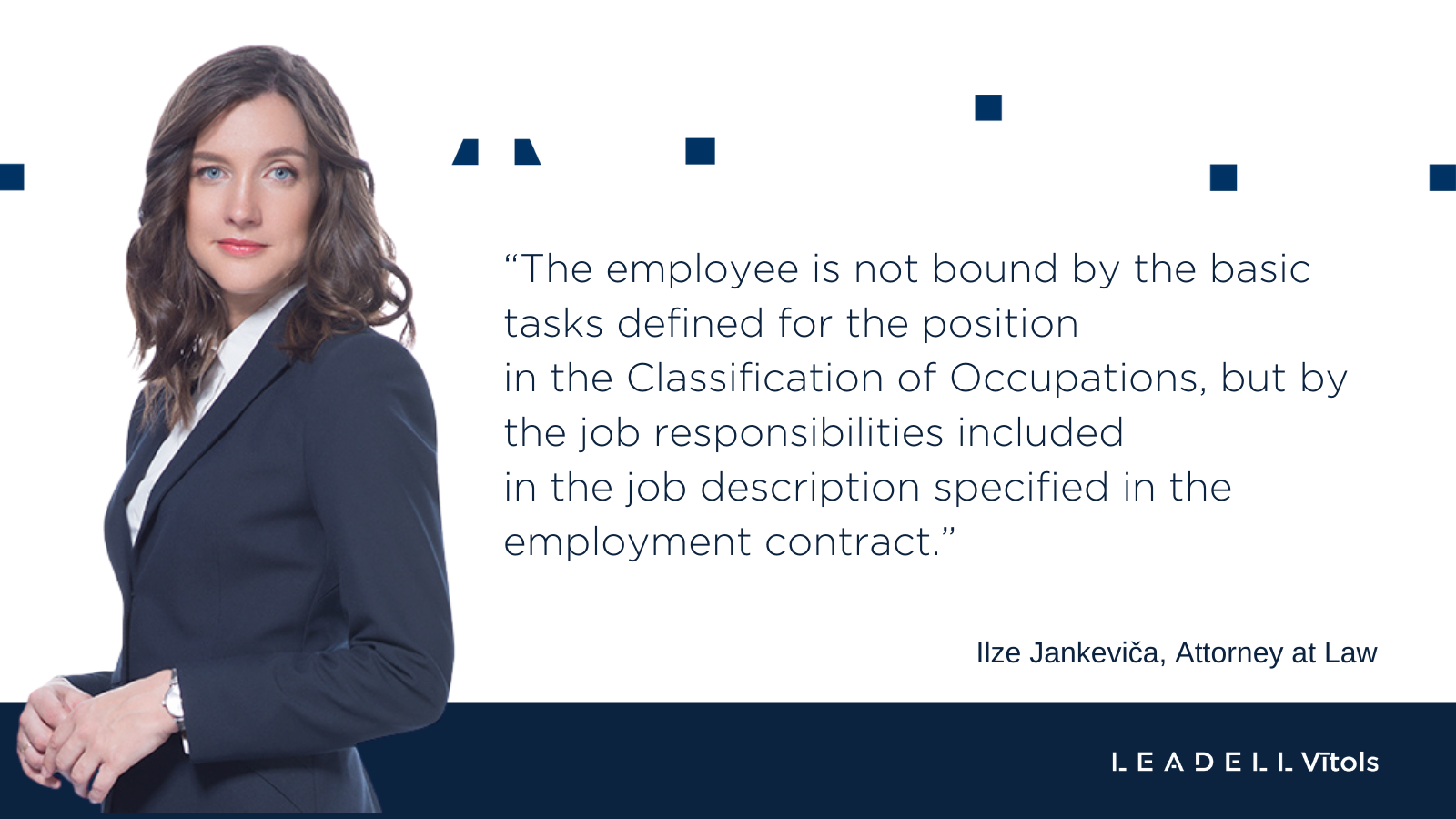News
What should be specified in the contract regarding the employee’s occupation and remuneration? | LEADELL Academy
Continuing the series of articles on the information to be included in the employment contract, we will look at the information that must be indicated in the contract regarding employee’s occupation and remuneration.
Choosing the occupation in conformity with the Classification of Occupations
The Labour Law (LL) stipulates that the employment contract must include information on the employee’s trade, profession, speciality (hereinafter – the occupation) in accordance with the Classification of Occupations. The Classification of Occupations has been approved by the Cabinet of Ministers (CM) Regulations No. 264 “Regulations Regarding the Classification of Occupations, Basic Tasks Corresponding to the Occupation and Basic Qualification Requirements”, and its purpose in accordance with Paragraph 3 of these Regulations is to ensure the recording-keeping and comparison of labour force corresponding to the international practice.
In order to facilitate the use of the Classification of Occupations, the website of the Ministry of Welfare provides both methodological instructions for its use and a search tool for finding the necessary information, such as occupation or profession code in the Classification of Occupations.
For the purpose of drafting an employment contract, the employer must choose one of the occupations included in the Classification of Occupations with the corresponding code, depending on which occupation’s basic tasks most closely coincide with the basic tasks assigned to the respective position by the company (employer). If the company has an occupation whose basic tasks correspond to different profession codes, the profession code for which the amount of corresponding basic tasks is more than 50% shall be applied, as explained by the Ministry of Welfare in the Methodological instructions for the use of the Classification of Occupations.
In practice, the occupation and its code can be indicated in the employment contract, for example, as follows: “The employer hires an employee as a lawyer (code of the Classification of Occupations 2611 01)”.
Job description is not just a formality
Along with information on the employee’s occupation, the employment contract must also include the general description of the contracted work. In practice, the general description is included in the job description, although the LL does not provide for a mandatory job description. The job description is most often attached as an appendix to the employment contract, and may include the title of the occupation, the code of the Classification of Occupations and a list of employee’s job responsibilities, as well as the employee’s subordination, rights and responsibilities, and information on qualifications.
When defining job responsibilities, the employer may use the basic tasks included in the Classification of Occupations for the respective occupation, amending and supplementing them if necessary. However, it should be emphasized that the employee is not bound by the basic tasks defined for the position in the Classification of Occupations, but by the job responsibilities included in the job description specified in the employment contract.
This was held by the Riga City Latgale Suburb Court in the judgment of 17 November 2015 in case C29607115 emphasizing that the indication of an occupation in an employment contract according to the Classification of Occupations does not determine the employee’s job responsibilities, however, it gives an insight of what the basic tasks of the employee in the specific position and what the basic requirements necessary for the performance of work duties could be. In the present case, the applicant’s duties set out in the employment contract and the job description were binding on the employee, who must therefore fulfill them. If an employee were bound only by the basic tasks and basic qualification requirements specified in the Classification of Occupations, the employment contract could specify only the employee’s occupation according to the Classification of Occupations and the employee’s duties would include only the basic tasks specified for the respective profession, without taking into account the specifics of a particular job.
It should be noted that job description is not only a formal legal requirement, since the existence of a job description creates certainty in the relationship between the parties, as both the employer and the employee understand their duties, responsibilities, etc., connected to the job. The job description and its content are also useful in resolving disputes between employees and employers about the proper performance of work duties, the employer’s orders for the performance of additional tasks, which can assess what duties are assigned to the employee and whether they are performed, as well as, whether the employer, when anticipating any task, has not determined additional work, etc.
Salary must always be indicated
In addition to the occupation, the employment contract must also specify the amount of salary, i.e. the remuneration to be paid to the employee on a regular basis. The concept of payment includes salary, supplements, bonuses and any other kinds of remuneration related to work (Article 59 of the LL).
On the other hand, the concept of salary is not included in the LL, which was pointed out by the Senate in the judgment of 20 December 2012 in case SKC-2268/2012. Namely, the LL does not precisely define the term “salary”, but the content of this term follows from Article 61 and 62 of the LL. Salaries are the basic element of remuneration and are therefore directly linked to the employee’s obligation to perform the work, not to any special additional circumstances, and the employer’s obligation to pay it regularly.
It follows that the salary as a basic element of the remuneration must always be indicated in the contract. In addition, pursuant to the LL, the salary set for an employee working full time shall not be less than the minimum level determined by the State. The amount of the minimum monthly salary and the hourly tariff rate are provided for in Cabinet Regulation No. 656 “Regulations regarding the amount of the minimum monthly salary within normal working hours and the calculation of the minimum hourly rate”.
In turn, other components of remuneration are included in the contract depending on the circumstances, for example, if payment is provided by law or based on a decision of the employer. For example, from the Senate judgment of 28 November 2013 in case SKC-1770/2013 such elements of remuneration are derived as salary and royalties, indicating to the Senate that the principle of freedom of contract allows an employee and employer to determine remuneration in combination, including a fixed amount of the salary, as well as a variable amount in the form of the author’s remuneration for the creation of the author’s work provided for in the employment contract.
When looking at the disclosing of salary in the contract, it is worth noting that the LL does not specify whether the salary should be reported as pre-tax (gross) or after-tax (net), however, in practice salaries are more often reported before tax (gross). In its judgment of 13 November 2013 in case C33296513, the Chamber of Civil Cases of the Riga Regional Court indicated that in accordance with Article 71 of the LL, when disbursing remuneration, an employer shall issue a calculation of the remuneration in which the remuneration disbursed, the taxes deducted and the mandatory State social insurance contributions made. Consequently, it can be concluded that the LL norms do not provide that the amount of salaries and employment-related payments before their payment shall be indicated separately after payment of taxes. However, as the authors of LL’s commentaries have pointed out, both in situations where the salary is indicated as a gross amount and when it is indicated as a net amount, it is important to regulate it precisely in the contract.
In addition, it should be noted that the indication of the amount of a specific salary in the contract may also be replaced by a reference to the provisions regulating remuneration contained in other laws or regulations or a collective agreement, or a reference to the working procedure regulations (Article 40 (3) of the LL). Thus, for example, if the amount of remuneration derives from a legislative act, the employment contract may include only a reference to the provisions of that specific legislative act.
You have to pay twice a month
In addition to the amount of remuneration, the time of payment of remuneration must also be indicated in the employment contract. Pursuant to Article 69 of the LL, remuneration shall be disbursed at least two times a month, unless the parties have agreed that the remuneration shall be disbursed once a month. Thus, by agreement of the parties, the employment contract may also stipulate that the remuneration is paid once a month, for example, on the 10th of each month. At the same time, we can agree with the LL commenters, that in practice the employer and the employee can also agree on more frequent payments, for example, at the end of each week.
In addition, as in the case of salary, information on the time of payment of remuneration may be replaced by a reference to the relevant provisions contained in other laws or regulations or in a collective agreement, or by a reference to the working procedure regulations.
What to do if there are uncertainties or difficulties arising from the employment contract?
If you need help with labour law matters, please contact our lawyer Ilze Jankeviča.

Lawyer Ilze Jankeviča shared her knowledge at the LEADELL Academy. Ilze has in-depth knowledge in the field of labour law and she would be pleased to help you in finding solutions to issues arising from employment relations. In the following articles, we will look at mandatory and optional information that must be included in the employment contract.
Read more in LEADELL Academy
Categories
Subscribe to Leadell's Newsletter







